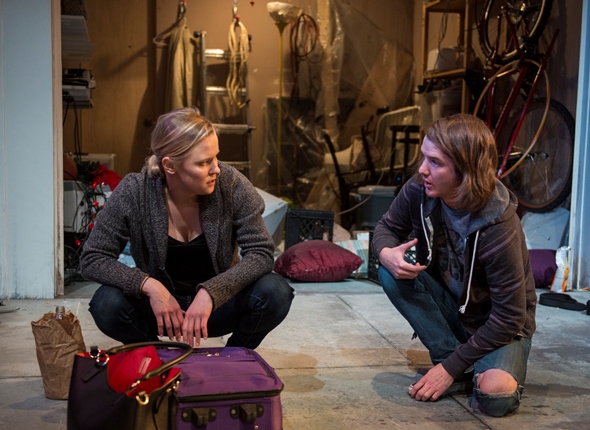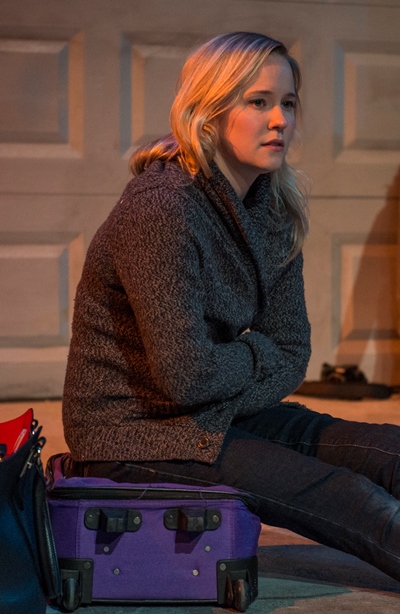‘Bruise Easy’ at American Theater: Miserable siblings recall childhood with Mommy dearest
 “Bruise Easy” by Dan LeFranc, world premiere at American Theater Company, through Feb. 14. ★★
“Bruise Easy” by Dan LeFranc, world premiere at American Theater Company, through Feb. 14. ★★
By Lawrence B. Johnson
There’s a critical difference between a play that is intensely provocative and one that is essentially an unfinished puzzle. Dan LeFranc’s “Bruise Easy,” now in its world premiere run at American Theater Company, falls into the latter category. It is a tale fraught with sex and monosyllables, signifying we know not what.
 Estranged adult siblings Alec and Tess, unhappy in their separate worlds, are reunited on the driveway of their mother’s home, where Alec, perhaps in his early twenties, still lives. Tess, a few years older, shows up pulling a small suitcase but also dragging much heavier baggage not immediately perceptible.
Estranged adult siblings Alec and Tess, unhappy in their separate worlds, are reunited on the driveway of their mother’s home, where Alec, perhaps in his early twenties, still lives. Tess, a few years older, shows up pulling a small suitcase but also dragging much heavier baggage not immediately perceptible.
These are the troubled offspring of a divided household. Some years earlier, when the parents split up, Tess went with Dad. Now she is – or perhaps was – married; she has left her husband and is pregnant, maybe by him but maybe not. Tess, let there be no mistaking, is miserable and unmoored. But she’s a model of personal success and stability compared with her stay-at-home brother, who from word one – well, grunt one – displays the intellectual prowess and emotional estate of a six-year-old. It seems Mom is supposed to be on hand for this little get-together, but Alec mutters that she’s gone. True in every sense of the word.
Here I must credit Matt Farabee and Kelly O’Sullivan with committed performances as the feckless, barely verbal, bereft young man and the woman who has hit the reset button only to discover that she can’t relocate her starting place. The problem is a play that isn’t taking them anywhere or telling us quite enough about them.
 The absent mother sounds like bad news, and poor Alec seems to embody Mom’s worst headlines. There’s strong intimation that he’s had a life-long relationship with his mother that is not only incestuous but perverse. If the “Easy” component of the play’s title suggests vulnerability, the “Bruise” part might be taken literally, physically. Alec has evidence of that in his camera, and he’s expert at the art of anatomical décor known as the hickey. He even demonstrates this pleasurable skill on his sister.
The absent mother sounds like bad news, and poor Alec seems to embody Mom’s worst headlines. There’s strong intimation that he’s had a life-long relationship with his mother that is not only incestuous but perverse. If the “Easy” component of the play’s title suggests vulnerability, the “Bruise” part might be taken literally, physically. Alec has evidence of that in his camera, and he’s expert at the art of anatomical décor known as the hickey. He even demonstrates this pleasurable skill on his sister.
Physical fun with Sis doesn’t end there, however, and we progressively come to understand that what came around went around as Alec and Tess were growing up. To put it in the most genteel of terms, this is a family with issues. At one point, affection creeps (a considered verb) across the line of normalcy, and at another it explodes into a violent tumble that looks like a fight but ends more closely resembling something quite different.
While Alec in his laconic fashion initiates most of the action in this drive-way vigil, which continues through the night and into the morning with nary of sign of Mom, his lead – whether overt or by innuendo – invariably draws Tess in. If he’s the damaged homeboy, she’s into the ceremonies of homecoming. We can see the depth of Alec’s bruises; the question looming ever larger is: What about Tess? Was she victimized, too? The question goes unanswered.
 For that matter, we never get solid information about Alec’s relationship with his mother. While it doesn’t look good, the evidence is all circumstantial and open to interpretation, or perhaps psychiatric probability. What’s certain is his isolation and his pain – his, and indeed hers. What’s exasperating, from the standpoint of a theatergoer who expects to see some degree of psychological movement, is that these two young people seem to find neither solution (not even a bad one) nor hope in each other.
For that matter, we never get solid information about Alec’s relationship with his mother. While it doesn’t look good, the evidence is all circumstantial and open to interpretation, or perhaps psychiatric probability. What’s certain is his isolation and his pain – his, and indeed hers. What’s exasperating, from the standpoint of a theatergoer who expects to see some degree of psychological movement, is that these two young people seem to find neither solution (not even a bad one) nor hope in each other.
Playwright LeFranc doesn’t allow either of his tormented characters to spill it out: what was done to them, what they actually witnessed – with an intriguing exception. Tess insists that Alec was still sleeping in his mom’s bed at age 13. He sharply denies it, and that’s that.
We’re also teased with a phone call that Tess answers while walking away from Alex and out of our sight. Suddenly, from afar, her voice rises with intense refusal or rejection or forbiddance. Was it her husband on the line? Her father? A lover? Only the playwright will ever know.
The play does have a sort of eventful ending, which custom forbids disclosing but which serious critical discourse pleads to reveal. Custom shall prevail, but it’s far from a useful denouement. Let’s just say the meek, introverted and hapless one suddenly emerges like Clark Kent from a phone booth. This guy is going to save someone’s world?
 A pint-size Greek chorus – masked neighborhood kids in masks who pop in occasionally to confirm that things are not going well and that, well, whatever – does not raise this affair to Sophoclean heights. Nor do I see what more director Joanie Schultz might have done by way of filling in the blanks. As they say about love, if it ain’t there, it ain’t there.
A pint-size Greek chorus – masked neighborhood kids in masks who pop in occasionally to confirm that things are not going well and that, well, whatever – does not raise this affair to Sophoclean heights. Nor do I see what more director Joanie Schultz might have done by way of filling in the blanks. As they say about love, if it ain’t there, it ain’t there.
Chelsea M. Warren’s uncomplicated set consists of a driveway and garage door. Quite realistic, though between scenes the wall framing the garage door erupts into a dancing light show devised by Lee Keenan. The garage door is in fact functional, popping open at one point to display assorted junk inside. Could this be the aha moment, the narrative breakthrough? There is quite a lot of breakage – but it’s just more sound and fury confirming what we already knew, that one of these unhappy souls is very, very annoyed with Mom.
Related Links:
- Performance location, dates and times: Details at TheatreinChicago.com
- Preview of American Theater Company’s complete 2015-16 season: Read it at ChicagoOntheAisle.com
Tags: American Theater Company, Bruise Easy, Chelsea M. Warren, Dan LeFranc, Joanie Schultz, Kelly O'Sullivan, Matt Farabee

